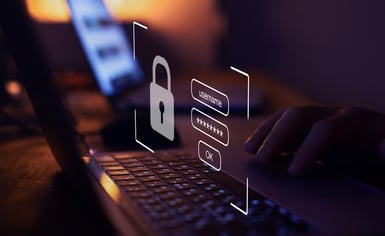 October is Cybersecurity Awareness Month, and we've got some tips for staying safe in today's tech-heavy world.
October is Cybersecurity Awareness Month, and we've got some tips for staying safe in today's tech-heavy world.
1. Be Smart About Using Public Wi-Fi
The wi-fi in a coffee shop, hotel, or a passenger jet may be free and easy to connect to, but these are the same reasons hackers love to use them to launch malware attacks on unsuspecting victims. When using public wi-fi, always assume your personal information at risk, including your usernames and passwords. And remember: You may not even realize you're information is being stolen. Take a look at the Federal Trade Commission's (FTC) recommendations for safely using public wi-fi.
2. Use Antivirus Protection & Firewall
Antivirus (AV) software regularly scans your device to detect and remove viruses. In addition to AV protection, you can also choose to install a firewall. Firewalls monitor incoming and outgoing network traffic and block what they see as potential threats. Both hardware and software firewalls are options, each with their own benefits. Do research beforehand to determine which is best in your situation.
3. Create Strong Passwords
There are three main criteria that make up a strong password: length, complexity, and predictability.
- Length: A strong password should be at least 12 characters long.
- Complexity: A strong password contains a mix of uppercase letters, lowercase letters, symbols, and numbers.
- Predictability: A strong password should be difficult for others to guess but easy for you to remember. Instead of using a literal password, try using a passphrase; for example, a phrase from one of your favorite movies or books. Additionally, use a different password for each of your online accounts and apps. If you use the same password for everything and someone figures out your password, that puts you at great risk for fraud.
4. Consider Using a Password Manager
Almost everything these days requires a password. But this creates a problem: Remembering all of your passwords. It's usually not the best idea to write your login credentials on a piece of paper, even if you think it's hidden where no one can find it. The FTC recommends using a password manager to help solve this issue. A password manager is a software program that stores your passwords in a virtual "vault." It can even create secure passwords for you if you're having trouble thinking of some. Some password managers can be conveniently downloaded as an app on your smartphone. If your considering using a password manager, do some research beforehand to make sure you’re downloading a legitimate and safe app. More information on password managers can be found on the FTC's website.
5. Keep Your Software Updated
This includes operating systems on your computer or smartphone, any desktop and mobile apps, AV protection, and browser plugins. Updating software not only adds new features and increases the efficiency of your software but also gets rid of security gaps that the software developers have become aware of in the meantime.
6. Know the Scams to Watch Out For
This is one of your greatest defenses. Educate yourself on fraud and scams so you know what to look out for. Cyprus Credit Union’s website is one of many resources that can help you learn more. Visit our Fraud Alerts & Prevention page for more information.



